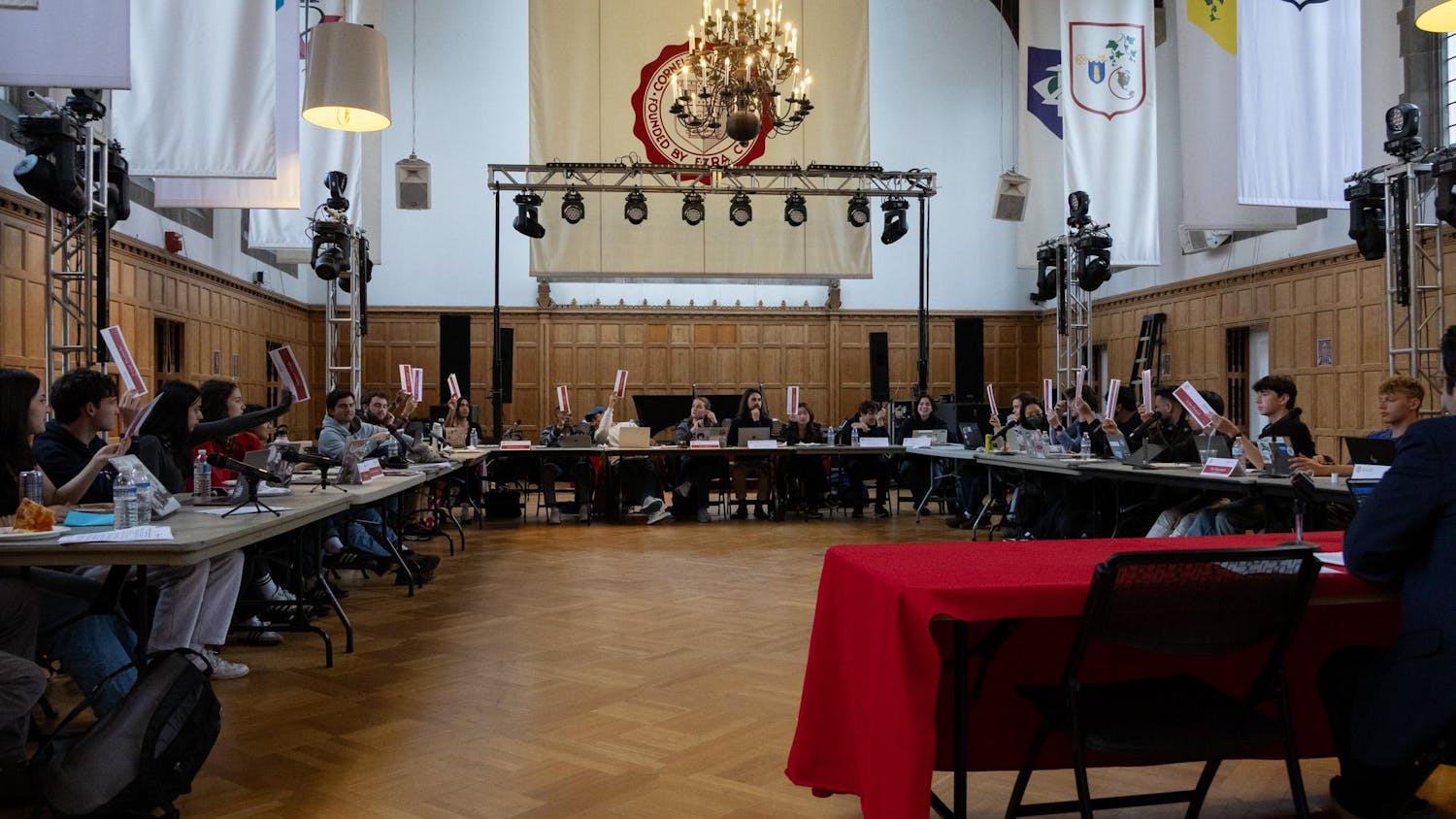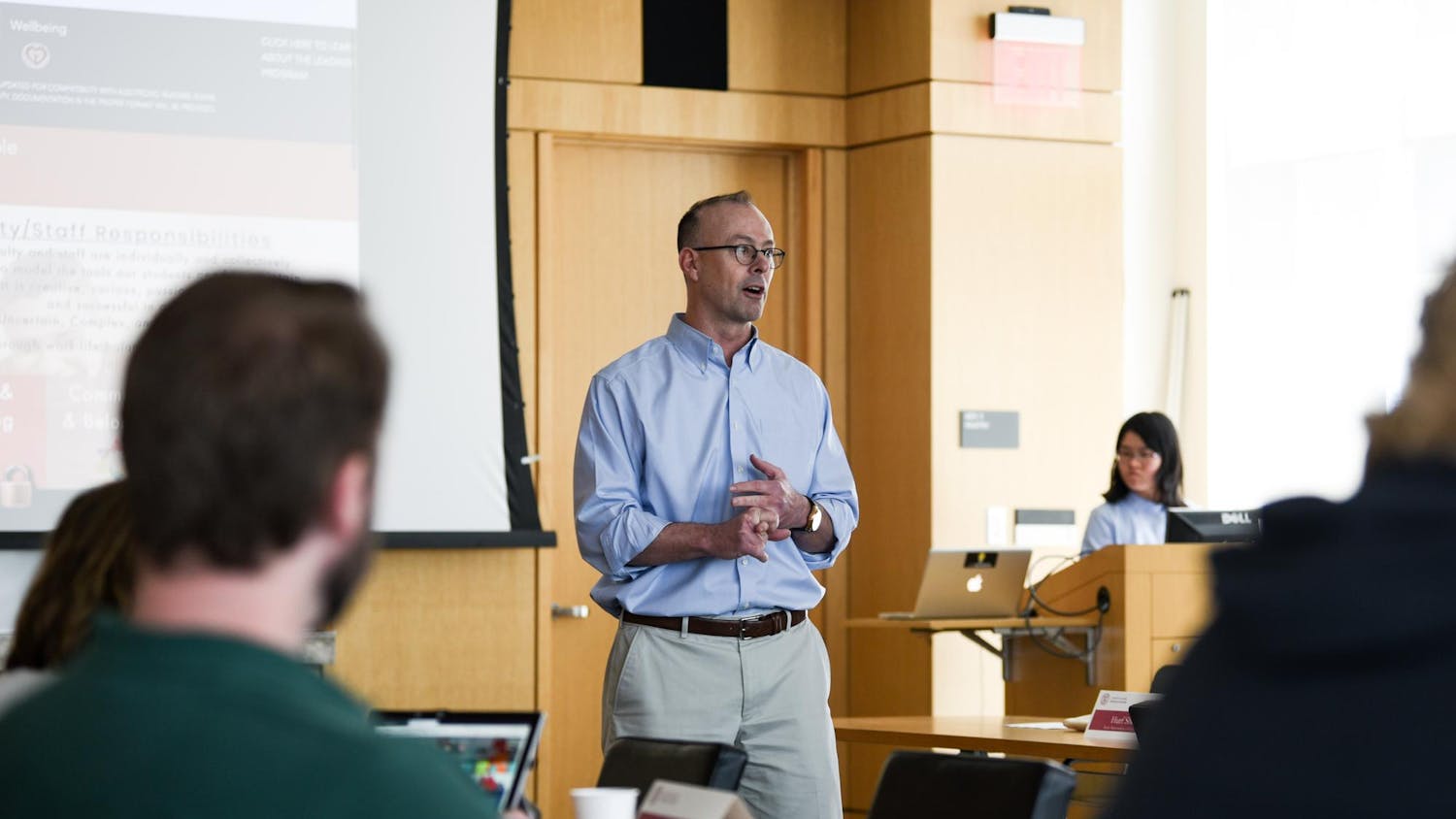“The People’s School will occupy the spaces that once kept us apart,” the organization declares in their mission statement.
On Friday, over one hundred Ithaca community members, Ithaca High School students and Cornell students and faculty congregated beneath a stark red “People’s School” banner in the Klarman atrium to rise to that occasion.
Arranged largely by Cornell undergraduate and graduate students, The People’s School hosted four sessions of facilitated lectures, conversations and workshops in an attempt to create a more apt environment for social justice learning.
Students, professional activists and community members facilitated the sessions, and their topics ranged from populism in America to Black Lives Matter to Islamophobia. Free soup was provided by Temple of Zeus.
Lucy Dean Stockton ’17, who facilitated a session about protest art, marked Cornell’s lack of accessibility as a key issue.
“I think academic institutions have a responsibility to make knowledge accessible to everyone, and I think that they’ve strayed from that,” she said. “I also think they have a purpose for improving the world for everyone, and I think that they’re failing.”
Session facilitator Barbara Regenspan, a lifelong activist and former professor of education at Colgate and Binghamton Universities, noted the contradictory role Cornell often plays as an elite institution.
“Elite education still has the possibility of enlightening its students about the persistence of massive social inequality,” she said. “But at this time most colleges and universities are bulwarks of the capitalist economy, and they tend to support the continued enrichment of [a] tiny percentage, as opposed to educating a wide array of students from all social classes.”
The People’s School has origins in anti-Vietnam War protests in the 70s, according to Emily Dong ’18, who helped organize the event.
“There’s a legacy of this, which is why I feel it is really organic,” she said.
Dong noted that the organization of the event was decentralized and that it came together through the collaboration of students, faculty, and community members.
“The People’s School is a space for anyone, whether you’re an Ithaca community member or a student, to share what you know,” she added. “We have the power, we know a lot.”
Anaar Desai-Stephens grad attended Dong’s session about the unpaid labor of student diversity groups.
“That was a room full of students of color and allies - and more broadly, I think this is way more diverse than your average Cornell gathering,” she said. “Right now, for the most part, a majority of what constitutes diversity at Cornell becomes something that’s roped back into Cornell’s branding. The kind of pat-on-the-back, multi-cultural institution that it is in this neoliberal age.”
Desai-Stephens added that Cornell on its own is inept at facilitating culturally diverse experiences due to a disproportionately white and male faculty.
“Those are the people who are facilitating a certain dissemination of knowledge and also represent the face of the institution, so that’s a problem,” she said.
While many said they hoped The People’s School would have happened regardless of the election results, they also acknowledged that Trump’s victory propelled the movement forward.
“The organizers acknowledged that this event was borne from the People’s Walkout at Cornell, which was itself an immediate and direct response to the presidential election results,” Stockton said. “However, I think there was a lot of alternative and radical organizing energy there before.”
Piragash Swargaloganathan ’19 initiated a discussion about Cornell’s relationship to Palestinian injustices, including its partnership with Technion University and its medical school in Qatar.
“There’s a perception that this is something post-2016 election, but these problems have always been here,” he said. “What I wanted to see more was this notion of being aware, being conscious of what’s going on, so this was a good start.”
Though the event was well-attended, Swargaloganathan, who hopes to draw attention to Cornell’s actions against Palestine with a Student Assembly referendum later this spring, had hoped for a higher turnout.
“I personally expected more Cornell students to be here, considering my friends being part of the Women’s March and other types of activities since the election,” he said. “[The election] has brought us the rather immediate realization that this is something we need to address right now, otherwise we might lose what we have as a governing structure. I’m glad the election has done that, but this is not something that is post-election.”
Regenspan agreed, adding that the current “overt fascist agenda” has alerted white people to these issues.
“This discussion is not part of the typical curriculum of elite colleges like Cornell or Colgate,” she said. “Hillary's victory would have put us back to sleep in accepting the limitations of a system that has always drastically diminished the life prospects of people in the black community before the election of Trump.”
Desai-Stephens said she’d like to see more events like The People’s School, adding that she hoped to take the next People’s School “off the hill.”
“Education isn’t top-down, it’s across and between and from the bottom up, and really between us as form of community building,” she said.
Dong added that The People’s School will hopefully continue to develop outside Cornell’s campus.
“The People’s School will hopefully become a more consistently occurring space,” she said. “The most important goal is to bring it downtown and make it sustaining…. The People’s School isn’t meant to stay on the hill.”

Over One Hundred Gather to Learn About Various Struggles, Organize ‘Mass Action’
Reading time: about 5 minutes
Read More










